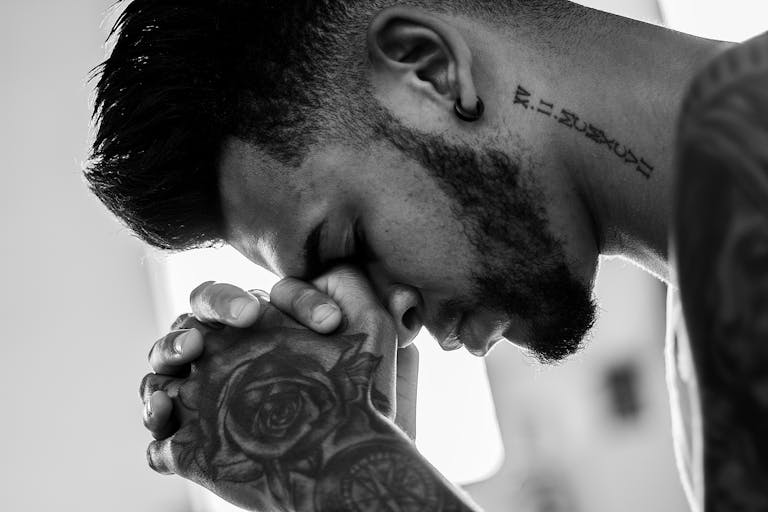Mental Health Matters: The Complete Guide for Dads to Stay Strong and Balanced
Pull up a chair, grab your favorite dad mug, and let’s chat about something that doesn’t always make it to our “Boy’s Night Out” conversations: our mental health. I’m just another dad in the trenches like you, trying to figure out this whole fatherhood gig while keeping my sanity intact. Trust me, I’ve had my fair share of 3 AM diaper disasters and “Why is the baby crying?” moments that made me question my life choices. But here’s the thing: taking care of our mental health is just as important as mastering the art of the one-handed diaper change.
In this guide, we’ll dive into the world of dad mental health, covering everything from the dreaded “dad bod” of the mind (yes, that’s a thing) to finding your zen in the chaos of fatherhood. We’ll talk about the stuff that keeps us up at night (besides the baby), how to juggle work and home without dropping the ball, and why it’s okay to admit that sometimes, being a dad is really freaking hard.
So, buckle up, Dad. We’re about to embark on a journey through the wild and wonderful world of fatherhood mental health. Don’t worry; I’ve packed some dad jokes for the road.

The Mental Health Landscape: Not Just a Mom Thing
Let’s face it, when we think about parental mental health, our minds often jump to moms. Postpartum depression, baby blues, the whole nine yards. But here’s a plot twist for you: dads can struggle too. In fact, studies show that up to 10% of new dads experience postpartum depression. That’s right, fellas, it’s not just a mom thing.
I remember when my first kid was born. There I was, standing in the hospital room, holding this tiny human that I somehow helped create, feeling like I should be on top of the world. Instead, I felt… overwhelmed. Terrified. And worst of all, I felt guilty for feeling that way. Wasn’t I supposed to be ecstatic?
Here’s the kicker: those feelings are normal. The problem is, we don’t talk about them enough. Society has this image of dads as these stoic, got-it-all-figured-out superheroes. But let me tell you a secret: even Superman probably had moments of doubt when he became a dad. (I mean, have you tried changing a diaper with super strength? Talk about pressure.)

Breaking the Silence: The Mental Health Stigma Around Fatherhood
Alright, let’s address the elephant in the room: the big, hairy stigma around men’s mental health, especially when it comes to fatherhood. We’re supposed to be strong, right? Providers, protectors, the rock of the family. But here’s a crazy thought: what if being strong meant admitting when we’re not okay?
I’ll never forget the day I broke down in tears while trying to assemble a crib. It wasn’t about the crib (okay, maybe it was a little about the crib – who designed these things?). It was about feeling overwhelmed, unprepared, and scared out of my mind about being responsible for another human life. And you know what? Admitting that felt like lifting a weight off my shoulders.
Here’s the deal: it’s okay to not be okay. It’s okay to admit that fatherhood is tough, that you’re struggling, that you need help. In fact, it’s more than okay – it’s necessary. By opening up about our struggles, we’re not just helping ourselves; we’re paving the way for other dads to do the same.
So, let’s make a pact, shall we? The next time you’re feeling overwhelmed, reach out. Talk to your partner, a friend, or a professional. Hell, talk to me on our Facebook page. Because breaking the silence is the first step to breaking the stigma.

Balancing Act: Fatherhood, Work, and Self-Care
Picture this: you’re at work, thinking about the mountain of laundry at home. You’re at home, worrying about that project deadline at work. And somewhere in between, you’re trying to remember the last time you did something just for you. Sound familiar?
Welcome to the great balancing act of fatherhood. It’s like trying to juggle flaming torches while riding a unicycle – on a tightrope. Over a pit of alligators. (Okay, maybe I’m exaggerating, but only slightly.)
Here’s a personal tidbit: I once found myself on a conference call, bouncing a fussy baby on my knee, while simultaneously trying to fold laundry with my feet. Spoiler alert: it didn’t end well. The baby cried, I missed half the meeting, and let’s just say those clothes needed to be rewashed.
The lesson? Something’s gotta give, and it shouldn’t be your mental health. Here are some dad-tested tips for finding balance:
1. Set boundaries: It’s okay to say no to overtime when you need family time.
2. Schedule self-care: Put it in your calendar if you have to. Even 15 minutes of “me time” can make a difference.
3. Communicate: Talk to your partner about sharing responsibilities. They’re not mind readers (unfortunately).
4. Lower your standards: Sometimes, a good-enough job is… well, good enough.
Remember, taking care of yourself isn’t selfish – it’s necessary. After all, you can’t pour from an empty cup, even if that cup is a “World’s Best Dad” mug.

The Silent Struggle: Postpartum Depression in Fathers
Alright, dads, let’s talk about something that doesn’t get enough airtime: postpartum depression in fathers. Yes, you read that right. It’s not just a mom thing.
When my second child was born, I felt… off. I was irritable, withdrawn, and felt disconnected from my family. I chalked it up to sleep deprivation (because, let’s face it, sleep becomes a mythical concept when you have a newborn). But it was more than that. I was dealing with postpartum depression, and I had no idea.
Here’s the thing: up to 10% of new dads experience postpartum depression. The symptoms can include:
- Feeling sad, hopeless, or overwhelmed
- Withdrawing from family and friends
- Feeling irritable or angry
- Significant changes in weight or appetite
- Difficulty bonding with the baby
If any of this sounds familiar, know that you’re not alone, and it’s not your fault. It’s a real condition that requires real support.

Building Emotional Resilience and Seeking Support
So, how do we weather the storms of fatherhood without losing ourselves in the process? It’s all about building emotional resilience – think of it as doing push-ups for your mind.
1. Practice mindfulness: Even if it’s just taking a few deep breaths while waiting for your coffee to brew.
2. Connect with other dads: Join a dad group, online or in-person. Talking to others who get it can be incredibly validating.
3. Seek professional help: There’s no shame in talking to a therapist. Think of it as a personal trainer for your mental health.
4. Stay active: Exercise isn’t just for avoiding the dad bod. It’s a powerful mood booster too. Try this for a few weeks and you’ll feel like a different man.
5. Maintain your interests: Don’t lose yourself in the role of “Dad.” Keep pursuing your hobbies and passions.
Remember, seeking support isn’t a sign of weakness. It’s a sign that you’re taking your role as a father seriously enough to make sure you’re at your best.

Challenges and Solutions: The Dad Edition
Let’s face it, fatherhood comes with its own unique set of challenges. Here are some common ones and how to tackle them:
1. Sleep deprivation: Take shifts with your partner if possible. And remember, it’s okay to ask for help from family or friends.
2. Financial stress: Create a budget and stick to it. Consider talking to a financial advisor if needed.
3. Relationship strain: Make time for date nights, even if it’s just watching a movie together after the kids are in bed.
4. Loss of personal time: Schedule it in like any other important appointment. Your “me time” matters.
Remember, every dad faces challenges. The key is how we handle them.
Dad-to-Dad FAQs
Q: Is it normal to feel overwhelmed sometimes?
A: Absolutely. Fatherhood is a big job. Feeling overwhelmed at times doesn’t make you a bad dad; it makes you human.
Q: How can I bond with my baby if I’m working full-time?
A: Quality over quantity, Dad. Make the most of your time together. Even simple things like bath time or reading a bedtime story can create strong bonds.
Q: I’m struggling, but I don’t want to burden my partner. What should I do?
A: Your mental health matters too. Open up to your partner. Chances are, they want to support you just as much as you support them.
Actionable Tips and Key Takeaways for Dads
1. Prioritize sleep whenever possible
2. Stay connected with friends and family
3. Don’t be afraid to ask for help
4. Make time for physical activity
5. Practice mindfulness or meditation
6. Maintain a sense of humor (dad jokes encouraged)
7. Celebrate the small victories
Wrapping It Up: Stay Strong, You’ve Got This, Dad!
Alright, fellow fathers, we’ve covered a lot of ground here. From breaking down stigmas to building up resilience, we’ve tackled the often-overlooked world of dad mental health. Remember, taking care of your mental health isn’t just good for you – it’s good for your whole family.
Being a dad is tough, rewarding, terrifying, and amazing all at once. It’s okay to admit when you’re struggling, and it’s more than okay to seek help when you need it. You’re not just a dad; you’re a human being with your own needs and challenges.
So, let’s make a pact: let’s start talking more about dad mental health. Let’s support each other, share our experiences, and break down those outdated ideas of what it means to be a “strong” father. Because true strength lies in vulnerability, in asking for help, and in taking care of ourselves so we can take care of our families.
You’ve got this, Dad. And remember, we’re all in this crazy, beautiful, sleep-deprived journey together.
Now, go forth and dad like a boss. And don’t forget to share your own experiences and tips in the comments below. After all, it takes a village – or in our case, a dad tribe.
P.S. Don’t forget to check out our other articles on fatherhood and follow our Facebook page for more dad-to-dad support. Because sometimes, the best parenting advice comes from the trenches.




